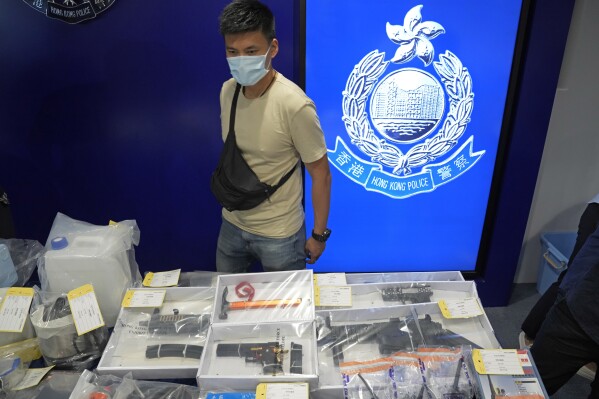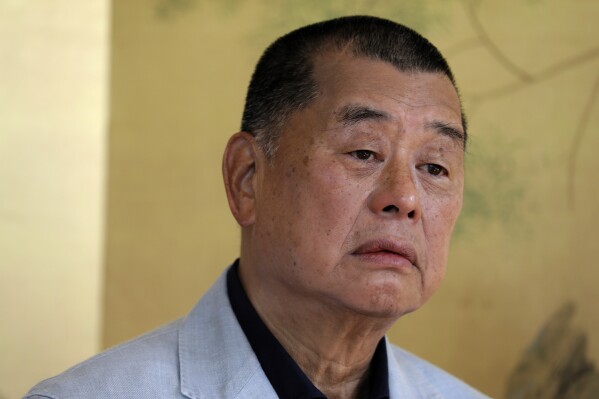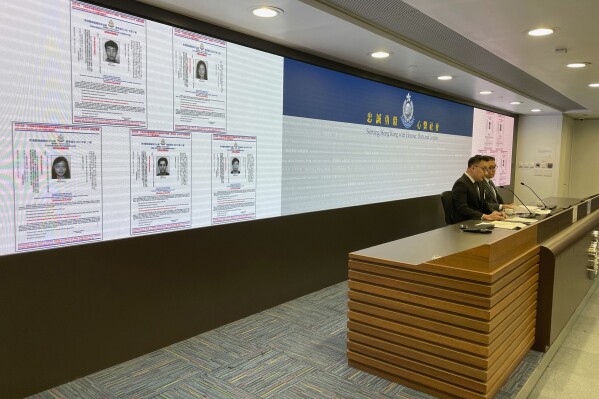A Hong Kong pro-independence activist seeks asylum in the UK after serving time over security law
HONG KONG (AP) — An activist who advocated for Hong Kong independence and was imprisoned under a sweeping national security law has fled to Britain to seek political asylum, according to his social media posts on Friday.
Tony Chung was among the first people convicted under the Beijing-imposed law introduced after the 2019 pro-democracy protests. He was found guilty of secession and money laundering in 2020 and sentenced to 43 months in prison.
The intimidation faced by Hong Kong dissidents like Chung reflects the drastic erosion of the freedoms promised to the former British colony when it returned to China in 1997. But both Beijing and Hong Kong have hailed the security law as bringing stability to the city.
Chung detailed in two Instagram posts how he was under a supervision order after his release from prison, banned from public speaking. He was asked to meet with national security authorities regularly and report on his whereabouts, people he had met and conversations he had.



He was prevented from taking up a specific summer job, he said, which effectively stripped him of financial autonomy. The authorities offered to pay him for information about others to prove he had reformed himself, he wrote, and wanted him to go to mainland China.
Chung said he was made to sign a document that barred him from disclosing his conversations with the authorities, so he could not seek help from any lawyers nor tell anyone about his situation.
“Under enormous stress and fear, I can only endure silently,” he said.
He started getting sick in October and doctors told him his immune system was compromised due to massive mental stress, he said in his posts. He later persuaded correctional services authorities to let him travel to Okinawa, Japan, for a holiday to manage his emotions. During the trip, he sought help from organizations and people based overseas. He arrived in Britain from Japan on Wednesday to seek asylum.
“This also means I can no longer return to my home, Hong Kong, in foreseeable future,” he said. “Although I had anticipated the arrival of this day in the past, I had a heavy heart when I made up my mind.”
Chung was convenor of the now-dissolved pro-independence student organization Studentlocalism before being arrested in 2020 near the United States Consulate in Hong Kong, where media reports said he was hoping to seek protection.
In a news conference, Leung Kin-ip, Hong Kong’s deputy commissioner of the Correctional Services Department, condemned Chung for “evading responsibility” and publishing comments “endangering national security.” He said a recall order has been issued for Chung to be brought back to prison to serve his remaining sentence. The department also instructed other enforcement agencies to put him on a wanted list.
Leung said Chung was required to let them know if he left Hong Kong and the duration of his travels but was not restricted from leaving the territory.
“This is a breach of trust. He lied to us that he would travel. This is very bad,” he said.
In response to questions about Chung being blocked from taking up the summer job, Leung said officers were allowed to impose restrictions if they deemed a person might repeat his crime as the department focused on rehabilitation needs. He insisted the department suggested other part-time jobs to Chung and that his department didn’t violate the right to freedom of speech.
In an email response to questions from The Associated Press, Hong Kong police strongly condemned the breach of supervision orders or bail conditions by individuals who have fled the city.
“Not only have they failed to reflect on the harms they have caused to Hong Kong and members of the public, but they have also shamefully begged for assistance from foreign anti-China forces under the guise of being victims,” the police said.
They did not confirm Chung’s claims that they had offered to pay him informant fees but said the national security department has been effectively collecting intelligence through various channels and individuals.
The city’s security apparatus has been trying to find information about several dissidents. Hong Kong police offered rewards for data leading to the arrests of 13 overseas-based activities and drew criticism from Western governments.
Earlier in December, prominent pro-democracy activist Agnes Chow, who left Hong Kong for Canada and doesn’t plan to return to fulfill her bail conditions, reported similar pressure from authorities. Her passport, confiscated earlier by police, was only returned to her upon meeting certain conditions, including a visit to mainland China with authorities, she said.
In an email reply to the AP, Hong Kong police said Chow failed to show up at a police station on Thursday as required and violated her bail terms. The reply said the police would “spare no effort in bringing her to justice.” Local media, including the South China Morning Post, quoted unnamed sources saying that Chow’s parents went to a police station to assist in their investigation Friday.
Now in Britain, Chung said he would devote himself to his city as a “Hong Konger in exile.”
“I believe only when Hong Kong people don’t give up, the seeds of freedom and democracy will sprout again one day,” he said.
Disclaimer: The copyright of this article belongs to the original author. Reposting this article is solely for the purpose of information dissemination and does not constitute any investment advice. If there is any infringement, please contact us immediately. We will make corrections or deletions as necessary. Thank you.
